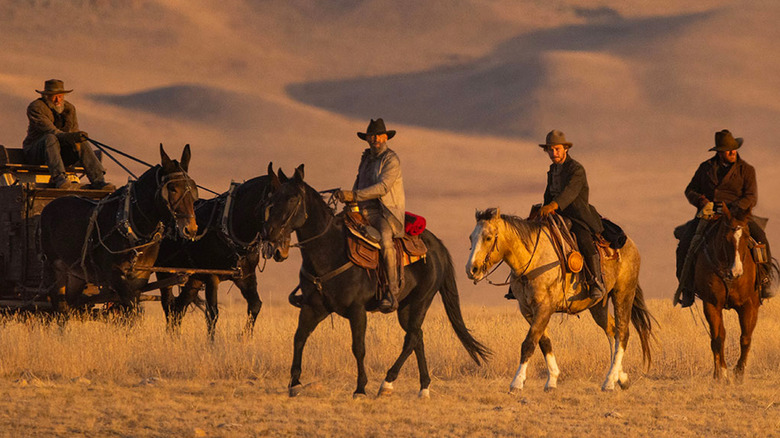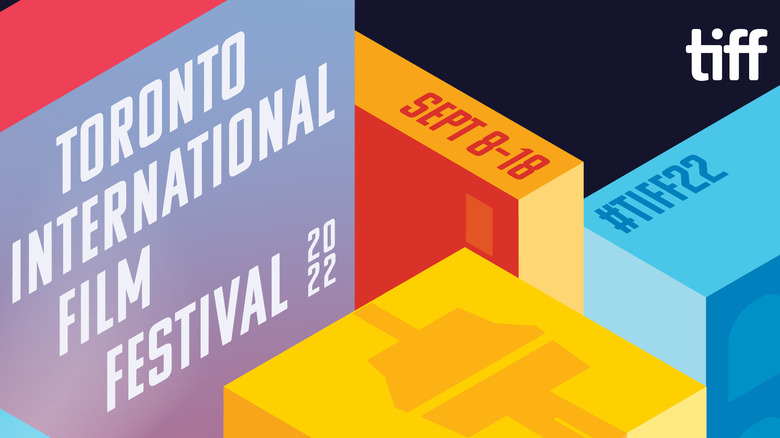Butcher's Crossing: A Bleak, Brutal, Abstract Western [TIFF]
"We don't belong out here," says Fred (Jeremy Bobb), a professional buffalo skinner. He's right. The "out here" is the vast, sprawling, harsh foothills of the Rocky Mountains, where a group of men have come to make a killing, both literally and monetarily, hunting buffalo. It's 1874, and the overwhelming theme of men being where they don't belong prevails through "Butcher's Crossing," Gabe Polsky's ultra-bleak abstract Western based on the novel by John Edward Williams (which I hear is also ultra-bleak, although I confess I have not read it). Shot on the cheap in 18 days, "Butcher's Crossing" makes a lot of little, stretching its small budget to the extreme to create a nightmarish saga of violent men who seem convinced of their own superiority over everything, especially the land.
Young Harvard dropout Will (Fred Hechinger, full twitchy, naive energy) has left behind a life of privilege to see the West. Specifically, he wants to go along on a buffalo hunt. Once, there were so many buffalo on the land that they resembled a great black sea. But abundant hunting has diminished their numbers, especially in Kansas, where Will arrives one day. After being turned away by an old family friend, the crusty buffalo hunt entrepreneur J.D. McDonald (Paul Raci), Will encounters the ominous Miller, played by Nicolas Cage.
Cage, of course, needs no introduction at this point, and while his character here eventually goes off the deep end, don't expect that meme-worthy Cage Rage. This is Cage at his most subdued, but still radiating energy that can only be described as malevolent. With a bald head that he continually shaves with a straight razor and a salt and pepper beard, Cage looks different than we're used to seeing him, and he uses that physical transformation to help create Miller as a determined, obsessed man. Like Captain Ahab, he will not listen to reason. He needs to kill. He's a great buffalo hunter, but others are wary of him because of his intensity. His seemingly only friend is a constantly drunk, one-handed preacher named Charley (Xander Berkeley).
While the buffalo have thinned in Kansas, Miller tells Will of a mythical-sounding valley near the Rockies where the buffalo roam and the skies are not cloudy all day. All Miller needs is a huge chunk of change to fund the expedition. Will, eager to see the land, agrees.
Blood and bullets
The party consists of Miller, Will, Charley, and Fred, a surly, bullying buffalo skinner none of the men seem to like. Things go wrong almost immediately as the men get lost and run out of water, and it's just a small omen of the bad things to come. The men eventually do find water and get to their buffalo-rich location, and Miller proceeds to begin slaughtering the docile beasts. Will is fascinated at first, but the more Miller's rifle blasts away at the animals, the more Will's disposition begins to change.
Polsky stages all of this in stark, horrifying beauty, contrasting the brutality of it all — the killing, the skinning, the blood and gore — against the landscape, which seems so beautiful and so impossibly empty. It looks like a place that hasn't been spoiled by men — until Miller and his company arrive. Obsessed with killing, Miller keeps racking up a bison body count, and the other men begin to grow concerned. Fred theorizes that Miller wants to kill every single buffalo on the planet, and while Fred makes a living skinning the animals, he seems to have some sympathy for the creatures.
Things increasingly go from bad to worse, and Polsky creates a sense of unease and unshakable dread by cutting together little snippets of time representing Will's increasingly troubled mind. Eventually, the character essentially becomes mute, with Will looking on with wild eyes and a filthy face, unable to stop what he's set in motion. It all makes for an unbearably bleak experience, heightened by Cage's intensity and the toxic atmosphere that arises between the men of the party. And while this is plenty effective, it begins to grow tedious. You get the sense that Polsky is cutting together bits and pieces in order to hide the film's small budget, and while it mostly works, you start to notice the editing trickery as the misery drags on.
I was ultimately taken with "Butcher's Crossing" and all its horrors. Taken with the committed performances of the small cast, and the untouched landscape — at one point, a snowstorm blows in, and you can practically feel the bone-chilling cold. And taken with the crisp sound design, full of pounding metal, flickering fires, blasting rifles, and whipping winds But the film is also so unapologetically bleak that I don't think I'll ever want to pay "Butcher's Crossing" a second visit. Perhaps the film's ultimate lesson is to never go to a second location with Nicolas Cage.
/Film Rating: 7 out of 10

